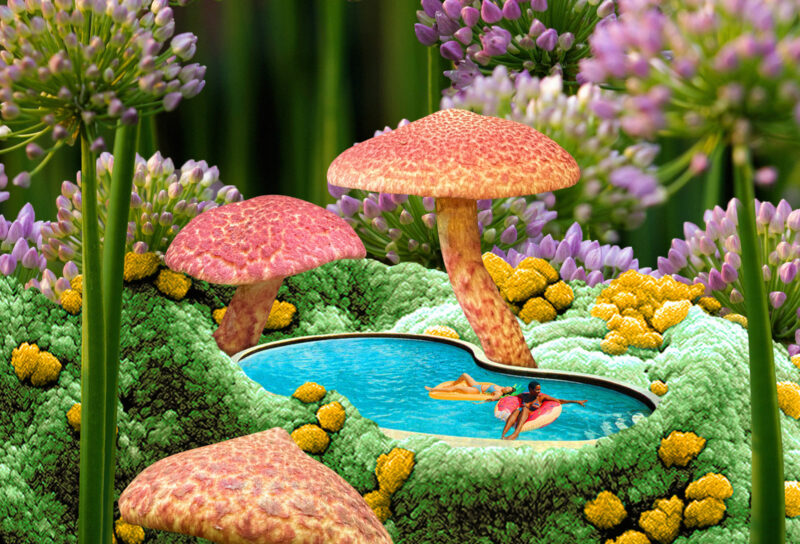We wrote this piece in 2018 for the Logic Magazine issue on Scale. It was sparked by conversations between Natsai and I, pondering one of the weird things about biology: Biology GROWS, it grows a lot, to unfathomable extent across the globe. At the same time, we often hear that biology can’t scale. But it must, somehow, if we hope to challenge the supremacy of the fossil fuel industry. And when it does, the way we think about industrial scale will change forever. —Christina Agapakis
A single E. coli placed in a sugary broth will divide into two genetically identical cells in twenty minutes. Another twenty minutes later, those two will grow and divide into four. Give those cells enough broth and room to grow and after about twenty-three hours there will be enough E. coli cells to fill an Olympic-size swimming pool. Wait another twenty hours and the mass of bacteria would equal the volume of the earth. Round it out to forty-eight hours and you’d have a ball of E. coli twenty-two times the size of Jupiter.
The scales possible with exponential growth are as incomprehensible as they are impossible. E. coli’s potential for exponential doubling is realized only in the highly controlled environment of a researcher’s test tube, where food is abundant and no other species are in the way. Even then, the time that bacteria can be expected to grow exponentially is inevitably limited—growth slows once nutrients start running low or the cells are too crowded to keep dividing further.
Biological growth scales to fit its context. There are no gas giants full of identical E. coli. More than one hundred years ago, D’Arcy Wentworth Thompson published On Growth and Form, a treatise on the mathematics of biological growth. In it, he summarizes this central maxim for biological scaling: “The effect of scale depends not on a thing in itself but in relation to its whole environment or milieu; it is in conformity with the thing’s ‘place in Nature,’ its field of action and reaction in the Universe.”
Biology’s ability to grow in relation to its environment—to grow ecologically rather than exponentially—is at the heart of what inspires biologists, engineers, and designers to work with organisms to build a new kind of technology. What if our technologies could grow and heal like living things? What if concrete could be set by the metabolism of microbes, any cracks repaired in situ? What if factories were replaced with farms, growing new things that could be recycled back into the soil? What if rather than trying to control nature, science and technology could become a part of it?
At the laboratory scale, biologists and engineers have designed organisms that can produce medicines, fuels, materials, and chemicals—living, biological sources for all kinds of stuff that today is more likely to come from petrochemical sources. But scaling these processes from the lab into products that people can use has proven challenging. Despite microorganisms’ penchant for exponential growth in the right conditions, adapting these techniques to systems of industrial manufacturing takes much more than placing a cell in a vat and waiting for it to grow.
Technology, as Ursula M. Franklin notes in The Real World of Technology, “entails far more than its individual material components. Technology involves organization, procedures, symbols, new words, equations, and most of all, a mindset.” A deep understanding of DNA, enzymes, and microbes—the individual material components—is necessary to scaling biological technologies. But so too is an understanding of chemical engineering and process development, environmental science and life cycle analysis, sourcing and supply chain management, economics and market dynamics, politics and regulatory governance, sociocultural forces, consumer needs and perception, product design, and marketing.
No one person can see across all these scales, from the molecular to the global. We need organizations and language to bridge scales and disciplines, to work together to achieve the necessary mindset of ecologically bounded technology.
As biological technologies emerge and scale, we must nurture not only the cells in our petri dishes and fermentation vats, but also the people, organizations, and systems that are necessary to grow a new kind of industry, scaled to our planetary context. A truly radical bio-industrial revolution will see the line between pastoral farmlands, biological foundries, and industrial factories completely blurred. In this new revolution, biology becomes both the creator and constrainer of scale, empowering everyone on the planet to live well—within limits.
A version of this piece was originally published in Logic Magazine.



